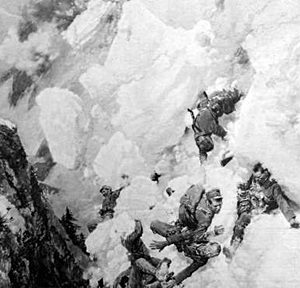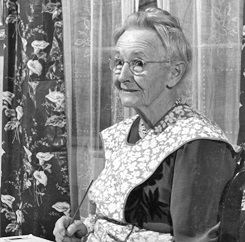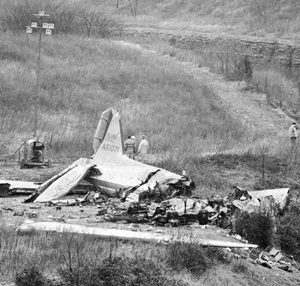On December 13…
“I look out the window sometimes to seek the color of the shadows and the different greens in the trees, but when I get ready to paint I just close my eyes and imagine a scene.”
~Grandma Moses

1862 – Union Major General Ambrose Burnside’s plan to move against the Confederate capital at Richmond, Virginia required crossing the Rappahannock River in Fredericksburg. Burnside planned to cross the river at that point and then continue south.
Due to poor execution of orders, however, a pontoon bridge was not in place for several days.
The delay allowed Confederate General Robert E. Lee to move his troops into place along Marye’s Heights high above Fredericksburg. The Confederates were secure in a sunken road protected by a stone wall, looking down on the open slopes that stretched from the edge of Fredericksburg.
Union soldiers had to leave the city, descend into a valley bisected by a water-filled canal ditch, and ascend an open slope of 400 yards to reach the base of the heights.
So strong was the Confederate position that one Rebel officer claimed “a chicken could not live on that field when we open on it.”
Burnside decided to attack anyway. Not once or twice but fourteen separate attacks up that slope as he watched his men get slaughtered in one of the most senseless charges in history.
The field was a killing ground for the attacking Yankees. No Union soldiers reached the wall at the top of Marye’s Heights, and few even came within 50 yards of it.
Burnside considered continuing the attack on December 14, but his subordinates urged him to stop. On December 15, a truce was called for the Union to collect their dead and wounded soldiers. Burnside retreated northward under the cover of darkness and rain.
The one-sided nature of the battle was reflected in the casualty figures. The Yankees suffered around 12,650 killed and wounded, while Lee lost only about 4,200 men.
General Joseph Hooker replaced Burnside as commander of the Army of the Potomac in January 1863.

1916 – A powerful avalanche killed hundreds of Austrian soldiers in a barracks near Italy’s Mount Marmolada.
Heavy snowfall in the Alps had created conditions ripe for avalanches and Austrian troops stationed in a barracks near the Gran Poz summit of Mount Marmolada were in particular danger. Although the camp was well-placed to protect it from Italian attack, it was situated directly under a mountain of unstable snow.
Approximately 200,000 tons of snow, rock and ice plunged down the mountain directly onto the barracks. 200 troops were pulled to safety, but 300 others died.
As the heavy snow and high winds continued over the next week, incidents like the one at Marmolada happened with disturbing frequency. Entire regiments were lost in an instant. The bodies of some victims weren’t found until spring.
The best estimate is that somewhere between 9,000 and 10,000 soldiers died by the end of December 1916 because of the avalanches.

1957 – Peyton Place premiered in Camden, Maine one day before opening in 24 cities across the U.S.
Loosely based on the novel of the same name – but sanitized due to the Motion Picture Production Code (Hays Code), a set of industry moral guidelines that was applied to most films released by major studios from 1930 to 1968 – the film received nine Oscar nominations (but no wins), including Best Picture, Best Actress (Lana Turner), Best Supporting Actress (Hope Lange and Diane Varsi) and Best Supporting Actor (Arthur Kennedy and Russ Tamblyn).

1961 – Anna Mary Robertson Moses, better known as Grandma Moses, died of natural causes at the age of 101.
She began painting in earnest at the age of 76 and created over 1,500 canvasses in less than three decades. She initially charged $3 to $5 for a painting, depending upon its size, but as her fame increased her works were sold for $8,000 to $10,000.
One of her most revered paintings, Sugaring Off, was sold for $1.2 million in 2006.

1977 – Air Indiana Flight 216 crashed near Evansville Regional Airport, killing 29, including the University of Evansville basketball team, support staff, and boosters of the team.
The crash was blamed on the pilot’s failure to remove locks on the right aileron and the rudder before takeoff, as well as an overloaded baggage compartment.
Two weeks after the crash, David Furr, the only member of the basketball team who was not on the flight (because of an ankle injury) was killed after being hit by a drunk driver.

1989 – Driving Miss Daisy, starring Morgan Freeman, Jessica Tandy, and Dan Aykroyd, premiered.
The film was a critical and commercial success upon its release and at the 62nd Academy Awards, it received nine nominations, and won four, including Best Picture and Best Actress (for Tandy).
The film was made at a cost of $7.5 million and grossed $146 million.

2000 – Vice President Al Gore reluctantly conceded defeat to Texas Governor George W. Bush in his bid for the presidency, following weeks of legal battles over the recounting of votes in Florida.
In a televised speech, Gore said that while he was deeply disappointed and sharply disagreed with the Supreme Court verdict that ended his campaign, “partisan rancor must now be put aside. For the sake of our unity as a people and the strength of our democracy, I offer my concession.”
Gore had won the national popular vote by more than 500,000 votes, but narrowly lost Florida, giving the Electoral College to Bush 271 to 266.

2003 – After spending nine months on the run, former Iraqi dictator Saddam Hussein was captured hiding in a six-to-eight-foot deep hole, nine miles outside his hometown of Tikrit.
His downfall began with an ill-advised invasion of Kuwait in 1990. A U.S.-led coalition invaded Iraq in 1991, forcing the dictator’s army to leave its smaller neighbor, but failed to remove Saddam from power.
Throughout the 1990s, Saddam faced both U.N. economic sanctions and air strikes aimed at crippling his ability to produce chemical, biological, and nuclear weapons.
With Iraq continuing to face allegations of illegal oil sales and weapons-building, the United States again invaded the country in March 2003, this time with the expressed purpose of ousting Saddam and his regime.

2001 – The Pentagon released a captured videotape of Osama bin Laden in which the al-Qaida leader said the deaths and destruction achieved by the Sept. 11 attacks exceeded his “most optimistic” expectations.
“We calculated in advance the number of casualties from the enemy, who would be killed based on the position of the tower. We calculated that the floors that would be hit would be three or four floors. I was thinking that the fire from the gas in the plane would melt the iron structure of the building and collapse the area where the plane hit and all the floors above it only. This is all that we had hoped for.”
Hold On Factoid:Stories in both the Canadian and British media, however, raised questions about the tape’s authenticity. These stories, besides pointing out the existence of the technical ability to create fake video tapes, also mentioned the suspicion of some people that the bin Laden figure was not Osama bin Laden himself.
The tape bore a label indicating it was made on November 9. It was “found” in a house in Jalalabad after anti-Taliban forces moved in. bin Laden appears to be dark skinned and heavy-set but on another tape, supposedly made ten days later, bin Laden appeared to be pale skinned and quite thin.

2002 – Cardinal Bernard Law resigned as Boston archbishop because of the priest sex abuse scandal.
Church documents showed he had extensive knowledge of sexual abuse committed by dozens of Catholic priests within his archdiocese and had failed to remove them from the ministry.
One priest alone was alleged to have raped or molested 130 children over decades, while Law and other local officials moved him among churches rather than going to the authorities.
Compiled by Ray Lemire ©2018 RayLemire.com / Streamingoldies.com. All Rights Reserved.